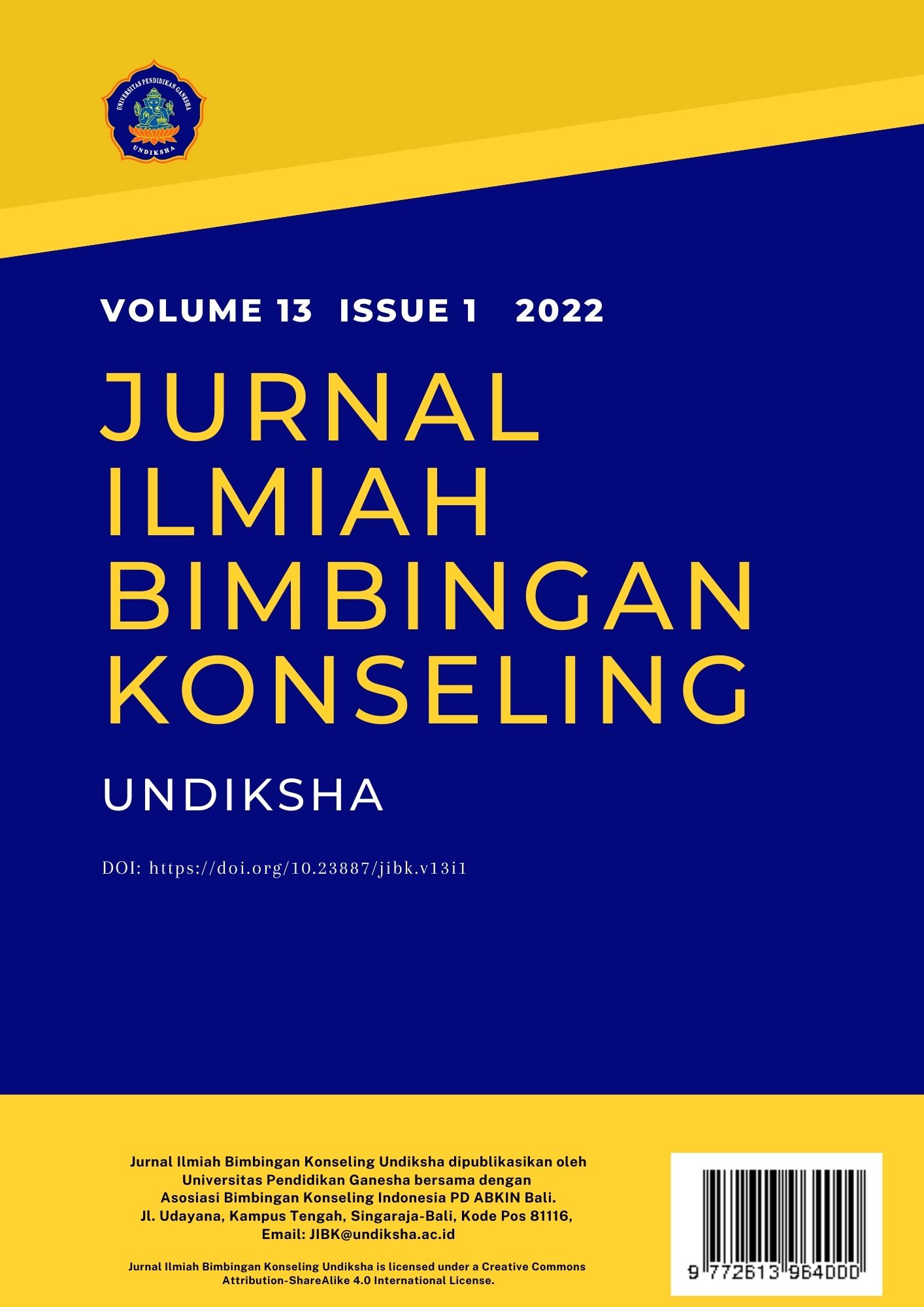Self-Esteem dengan Narsistik Pada Remaja Yang Hobi Foto Selfie Menggunakan Filter Instagram
DOI:
https://doi.org/10.23887/jibk.v13i1.45012Keywords:
Self-esteem, Narcissistic, AdolescentsAbstract
This study aims to determine the relationship between self-esteem and narcissistic. The participants in this study were students of class 12 Social Sciences SMAK Penabur Cirebon with a total of 58 people. Data collection uses a self-esteem scale consisting of 51 items and a narcissistic scale consisting of 19 items and both have met the requirements of good reliability. Data analysis using Pearson product moment correlation technique. The results of this study show a correlation coefficient of -0.749 with a significance value of 0.000 (p <0.05), meaning that there is a significant negative relationship between self-esteem and narcissistic, which means that the higher the self-esteem, the lower the narcissistic, and vice versa. self-esteem, the higher the narcissistic. Through this research, it is hoped that adolescents can maintain high self-esteem and have behaviors that keep self-esteem stable by knowing the advantages and disadvantages in themselves, in order to avoid the emergence of narcissistic behavior.
Abstrak:
Penelitian ini bertujuan untuk mengetahui hubungan antara harga diri dan narsistik. Partisipan dalam penelitian ini adalah siswa kelas 12 IPS SMAK Penabur Cirebon dengan jumlah 58 orang. Pengumpulan data menggunakan skala harga diri yang terdiri dari 51 aitem dan skala narsis yang terdiri dari 19 aitem dan keduanya telah memenuhi syarat reliabilitas yang baik. Analisis data menggunakan teknik korelasi product moment Pearson. Hasil penelitian ini menunjukkan koefisien korelasi sebesar -0,749 dengan nilai signifikansi 0,000 (p<0,05), artinya ada hubungan negatif yang signifikan antara harga diri dengan narsistik, artinya semakin tinggi harga diri maka semakin tinggi harga diri. menurunkan narsis, dan sebaliknya. harga diri, semakin tinggi narsistik. Melalui penelitian ini diharapkan remaja dapat mempertahankan harga diri yang tinggi dan memiliki perilaku yang menjaga kestabilan harga diri dengan mengetahui kelebihan dan kekurangan pada dirinya, sehingga terhindar dari munculnya perilaku narsis.
References
Adi, P. S., & Yudiati, M. E. A. (2012). Harga diri dan kecenderungan narsistik pada pengguna Friendster. Jurnal Psikologi, 3(1).
American Psychiatric Association. (1994). Diagnostic and statistical manual of mental disorders fourth edition text revision, DSM-IV-TR. Washington, DC: American Psychiatric Association Press.
Azwar, S. (2012). Penyusunan skala psikologi (edisi 2). Yogyakarta: Pustaka Pelajar.
Azwar, S. (2017). Metode penelitian psikologi. Yogyakarta: Pustaka Pelajar.
Bhakti, A. K., & Psi, S. Y. S. (2016). Hubungan antara harga diri dengan kecenderungan narsistik pada pengguna instagram ditinjau dari jenis kelamin (Thesis). Surakarta: Universitas Muhammadiyah.
Buffardi, L. E., & Campbell, W. K. (2008). Narcissism and social networking web sites. Personality and social psychology bulletin, 34(10), 1303-1314. DOI: https://doi.org/10.1177/0146167208320061
Campbell, W. K., & Miller, J. D. (2011). The handbook of narcissism and narcissistic personality disorder: Theoretical approaches, empirical finding and treatments. New Jersey: Jhon Wiley & Sons, Inc. DOI: https://doi.org/10.1002/9781118093108.oth1
Cecillia, L. D. (2017). Hubungan antara harga diri dengan kecenderungan narsistik pada siswa SMA Kristen 1 Salatiga yang menggunakan jejaring sosial instagram. Jurnal Psikohumanika, 9(1), 10-24.
Clarke, I. E., Karlov, L., & Neale, N. J. (2015). The many faces of narcissism: Narcissism factors and their predictive utility. Personality and Individual Differences, 81, 90-95. DOI: https://doi.org/10.1016/j.paid.2014.11.021
Coopersmith, S. (1967). The antecedent of self esteem. San Fransisco: W. H. Freeman Company.
Databoks.katadata.co.id. (2019). Berapa pengguna internet di Indonesia. Retrieved from https://databoks.katadata.co.id/datapublish/2019/09/09
Databoks.katadata.co.id. (2020). Orang indonesia habiskan hampir 8 jam untuk berinternet. Retrieved from https://databoks.katadata.co.id/datapublish/2020/02/26/indonesia-habiskan-hampir-8-jam-untuk-berinternet
Davison, G. C., Neale, J. M., & Kring, A. M. (2014). Psikologi abnormal (edisi 9). Jakarta: Rajawali Press.
Dewi, C. G., & Ibrahim, Y. (2019). Hubungan self-esteem (harga diri) dengan perilaku narsisme pengguna media sosial instagram pada siswa SMA. Jurnal Neo Konseling, 1(2).
Elliya, R., & Rahma, A. (2020). Hubungan harga diri dengan gejala narsistik (Narcissistic Personality Disorder) pada mahasiswa program studi pendidikan dokter Universitas Malahayati. Malahayati Nursing Journal, 2(2), 305-316.
Fausiah, F., & Widury, J. (2006). Psikologi abnormal klinis dewasa. Jakarta: Penerbit Universitas Indonesia.
Juditha, C. (2011). Hubungan penggunaan situs jejaring sosial facebook terhadap perilaku remaja di kota Makassar. Jurnal Penelitian IPTEK-KOM, 13(1), 1-23.
Kompasiana.com. (2016). Dampak perkembangan teknologi bagi masyarakat. Retrieved from https://www.kompasiana.com/gelsiisabel/5849aee42b7a61951c5ea447
Mehdizadeh, S. (2010). Self-presentation 2.0: Narcissism and self-esteem on facebook. Cyberpsychology, behavior, and social networking, 13(4), 357-364. DOI: https://doi.org/10.1089/cyber.2009.0257
Nationalgeographic.co.id. (2018). Penelitian: media sosial dan selfie mengubah seseorang menjadi narsis. Retrieved from https://nationalgeographic.grid.id/read/13998644/penelitian-media-sosial-dan-selfie-mengubah-seseorang-menjadi-narsis
Nursalbi, Y. (2017). Kecenderungan gangguan kepribadian narsistik pada remaja pengguna instagram (Skripsi). Pekanbaru: Fakultas Psikologi UIN Sultan Syarif Kasim Riau.
Sedikides, C., Rudich, E. A., Gregg, A. P., Kumashiro, M., & Rusbult, C. (2004). Are normal narcissists psychologically healthy?: Self-esteem matters. Journal of personality and social psychology, 87(3), 400. DOI: https://doi.org/10.1037/0022-3514.87.3.400
Santrock, J. W. (2003). Masa remaja (edisi 6). Jakarta: Erlangga.
Wibowo, Y., & Silaen, S. M. J. (2018). Hubungan self-esteem dan penggunaan media sosial instagram dengan perilaku narsisme di kalangan siswa kelas VIII SMPK Penabur Bintaro Jaya. IKRA-ITH HUMANIORA: Jurnal Sosial dan Humaniora, 2(2), 109-115.
Yusuf, S. (2014). Psikologi perkembangan anak dan remaja. Bandung: PT. Remaja Rosda Karya.
Downloads
Published
Issue
Section
License
Copyright (c) 2022 Olivia Margaretha, Christina Hari Soetjinigsih

This work is licensed under a Creative Commons Attribution 4.0 International License.
Jurnal Ilmiah Bimbingan Konseling Undiksha is an Open Access Journal. The authors who publish the manuscript in this journal agree to the following terms:
JIBK is licensed under a Creative Commons Attribution 4.0 International License. This permits anyone to copy, redistribute, remix, transmit and adapt the work provided the original work and source is appropriately cited.
This means:
Jurnal Ilmiah Bimbingan Konseling is licensed under a Creative Commons Attribution 4.0 International License.
(1) Under the CC-BY license, authors retain ownership of the copyright for their article, but authors grant others permission to use the content of publications in JIBK in whole or in part provided that the original work is properly cited. Users (redistributors) of JIBK are required to cite the original source, including the author's names, JIBK as the initial source of publication, year of publication, volume number, issue, and Digital Object Identifier (DOI); (2) The authors are the copyright owner of the article, and the author grants the JIBK held the first publication right.









.png)

.jpg)
